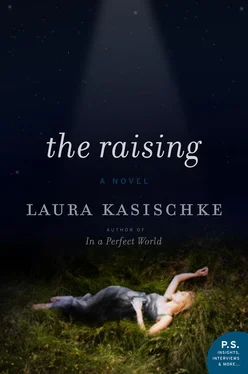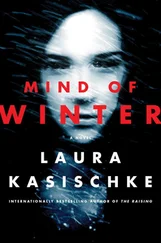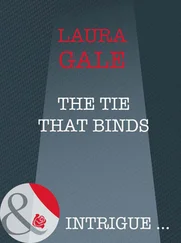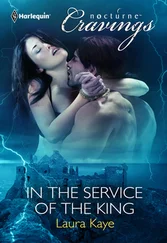Craig had looked down at his lap, as he always did, and then rubbed his eyes where he saw, against his lids, a woman’s face.
Unfamiliar.
It was round as a moon. She was speaking to him in a foreign language, but somehow he understood what she was saying:
Don’t move the girl.
Craig looked up at Dr. Truby. He said, “I think there was a lady there.”
Dr. Truby nodded. His head was shaved, and so perfectly shaped it seemed to have been made with the idea of shaving it in mind.
“And this lady…?” Dr. Truby moved his hand through the air, churning it in his own direction.
Craig thought for a minute, and then said, “She told me not to move Nicole.”
“And then you…?” Again, the paddling. Pulling him in.
Craig had looked down at Dr. Truby’s shoes. Slippers? Loafers. They looked soft and suede, not like something you could wear to walk on pavement.
“And then…?”
But Craig had no words for what came after that.
After that, there were hands on him. A blow to the stomach. His head and ears were ringing. And water. Was he being baptized? There was a needle in his arm. A man in a blue uniform shouting at some flashing lights. Someone kicked him hard in the ass, and then he was stumbling. And all the time, he was trying to ask about Nicole, but the words came out so garbled he knew no one could understand him. Someone wanted to know if Craig knew his own name, and where he was, but when Craig tried to form, in his mouth, the shape of the words of her name, someone said, in a soothing voice, “You shouldn’t think about that now. You should rest. Nicole is dead.”
“I don’t know,” Craig had said, and Dr. Truby, who must have been waiting for a long time for Craig to say more than this, leaned back in his chair, looked at the ceiling, and sighed.
Mira always started the semester with the story of Peter Plogojowitz:
In 1725, in the village of Kisilova, a peasant by the name of Peter Plogojowitz died of natural causes and was buried. Within a week, nine other villagers died, and Peter Plogojowitz appeared to his wife demanding his shoes. It was widely assumed that the dead man was “walking,” and that he was the cause of the other deaths, so his grave was dug up and the corpse examined.
Except for his nose having fallen away, Peter looked as good as new in his grave. His hair and beard and nails had grown. His skin had peeled away, and what looked like new, pink skin had grown beneath it. There was fresh blood in his mouth. The crowd that had gathered at the grave became enraged. A stake was driven through the peasant’s heart, whereupon he shouted, bled from the ears and mouth, and acquired an erection. After that, the corpse was burned and the ashes scattered.
Peter Plogojowitz walked no more.
Several of the girls in the back row covered their mouths. One, a dark-haired beauty with nearly translucent skin, covered her whole face. A couple of boys began to laugh nervously, and some others chuckled loudly. A few of the more serious students were taking notes. Perry Edwards, the only student whose name Mira knew already, since she’d had to sign his override form, was nodding, looking at her so fixedly she felt as if he were looking through her.
“So,” Mira said. She clapped her hands together, turned to the blackboard, and picked up a piece of chalk. Holding it up, she said to the class, “What do we learn from this anecdote about the Serbian burial practices and superstitions of the eighteenth century?”
She wrote the number one on the board, a pale wisp of white dust rising from it.
Usually, no one had a word to say at this point. Perry Edwards had his hand raised.
“Yes?” she said, nodding at him to speak.
“Apparently they believed that a dead person could get out of his grave and back into it.”
Mira nodded. Next to the number one, she wrote, The dead can escape and reenter their graves .
“Two?” she asked.
There was a moment of polite silence before, again, Perry Edwards raised his hand.
“The dead who can do this don’t decay?” he asked.
Mira wrote on the board: 2. The “walking dead” do not decay as expected.
“And they cause other deaths,” Perry said without raising his hand this time. As Mira was writing this down, he continued. “They drink blood? They can be killed a second time, more completely?”
Mira wrote these down as well, and then: 6. These creatures are sexual in nature.
As Mira knew they would, the girls in the back with their hands over their mouths giggled, and the boys who’d chuckled before chuckled again. But Perry Edwards just held her gaze so long that, finally, Mira was the one who had to look away.
Craig tried hard not to stare at Nicole Werner while she studied, but the way her hair slipped over her face when she cast her eyes down on her History of the English Language textbook, and the way the highlighter in her right hand flashed over the pages, and even the way her foot seemed to tap out some rhythm for four or five seconds, then stop, was so much more riveting than the book he was reading that he couldn’t look away.
If she knew he was watching her, she was pretending she didn’t.
Perry had found a study room for them in the basement of Godwin Hall—an old lounge tucked away behind a storage room, with dust-covered chairs and maroon carpeting. There was a brass plaque on the door that read, THE ALICE MEYERS MEMORIAL STUDENT STUDY ROOM, and although it looked like no one had used the room for years for anything but furtive sex (empty condom wrappers were stuffed into a glass vase that was otherwise full of plastic flowers), it was really a very comfortable room.
There were no light bulbs in any of the lamps, so they’d brought down their own desk lamps from their dorm rooms and set them up on the end tables. The dim, focused light was intense and relaxing at the same time. Perry sat at a table in the corner, one elbow on each side of an open book. Nicole was curled up in a cushioned chair with a battered ottoman. Her roommate, Josie Reilly, sat on the floor with her back to the wall, legs folded in the lotus position as if her body were made of clay. Craig lay on the couch, watching Nicole over the edge of his book as she flipped a page and bit her lower lip.
He had thought a study group would entail talking. Quizzing. The sharing of test-taking tips. Maybe flash cards. He’d never been in a study group before so had no way of knowing that it meant, simply, a circle of companionable silence, concentration—except for the occasional yawn, the clearing of a throat, Nicole’s dainty sneeze, Josie’s distracted “Bless you.” It crossed Craig’s mind, when the silence grew so thick that you could have reached into the air and grabbed a handful of it, to crack a joke. But he didn’t know what the joke would be. It would have to be incredibly funny to warrant the interruption, and he wasn’t really that funny unless there was something to be made fun of, and nothing here seemed stupid enough to make the kind of joke Craig usually got a good laugh out of—the kind of comment that got him in trouble in high school or had Scar snorting chocolate milk out of his nose at the dinner table.
Now and then, their desk lamps flickered. (Maybe one of the washing machines in the laundry room next to the lounge had started its spin cycle and sucked up all the electricity in the basement for a minute.) Briefly, Nicole looked up to the ceiling, and then back down. She highlighted something else on the page she was reading, and then she took the pencil out of the place in her hair where she’d tucked it and wrote something quickly in the margin.
Читать дальше












